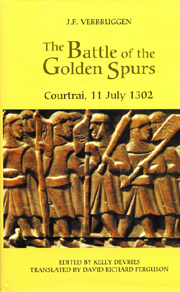 The Battle of the Golden Spurs (Courtrai, 11 July 1302)
The Battle of the Golden Spurs (Courtrai, 11 July 1302) Book contents
- Frontmatter
- Contents
- List of Illustrations
- General Editor's Preface
- Editor's Introduction to the 2002 edition
- Foreword to the 1952 edition
- Acknowledgements (to the 1952 edition)
- Preface: ‘An almost impossible event …’
- Introduction
- Part One Historiography and the Study of the Sources
- Part Two Historical Overview of the 1302 Campaign
- General Conclusion
- Bibliography
- Index
Editor's Introduction to the 2002 edition
Published online by Cambridge University Press: 12 September 2012
- Frontmatter
- Contents
- List of Illustrations
- General Editor's Preface
- Editor's Introduction to the 2002 edition
- Foreword to the 1952 edition
- Acknowledgements (to the 1952 edition)
- Preface: ‘An almost impossible event …’
- Introduction
- Part One Historiography and the Study of the Sources
- Part Two Historical Overview of the 1302 Campaign
- General Conclusion
- Bibliography
- Index
Summary
I first heard of the battle of Courtrai when I lived in Belgium in 1976–78. Interested in that nation's history, principally its medieval past, I read Patricia Carson's extremely well-written popular history, The Fair Face of Flanders. With its historical description of Belgium as the ‘slagveld van Europa’ (battlefield of Europe), Carson's book became, for me, a military history. Unfortunately for the Belgians, such a history does not have many high-points. They often participated in the wars fought in their country. But rarely were they victorious. One of their greatest victories, indeed one which is still celebrated today, was fought on July 11, 1302, and became known as the Battle of the Golden Spurs, based on the extremely large number of golden spurs captured there – between five and seven hundred, spurs given to knights as tournament prizes. These were taken by their Flemish captors to the nearby Church of the Virgin at Courtrai where they would hang as trophies for eighty years until removed by descendants of those original knights after the Flemish defeat at the battle of Westrozebeke.
The knights in question were French. Titularly the King of France, Philip IV (the Fair) at the time of Courtrai), was the king also of the Flemings. But it had rarely been a happy sovereignty, especially in the century prior to the Battle of the Golden Spurs. Both the count of Flanders and the large towns of the county rebelled frequently against their king.
- Type
- Chapter
- Information
- The Battle of the Golden Spurs (Courtrai, 11 July 1302)A Contribution to the History of Flanders' War of Liberation, 1297–1305, pp. xi - xviPublisher: Boydell & BrewerPrint publication year: 2001


